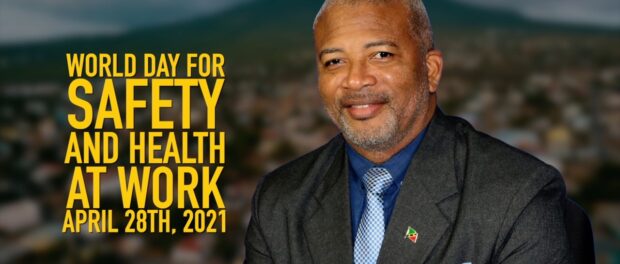Nevis Labour Minister Hon. Spencer Brand delivers address for World Day for Safety and Health at Work 2021
Get our headlines on WHATSAPP: 1) Save +1 (869) 665-9125 to your contact list. 2) Send a WhatsApp message to that number so we can add you 3) Send your news, photos/videos to times.caribbean@gmail.com

NIA CHARLESTOWN NEVIS (April 28, 2021) — The following is an address by Hon. Spencer Brand, Minister of Labour in the Nevis Island Administration (NIA) on the observance of the International Labour Organization’s (ILO) World Day for Safety and Health at Work 2021.
Fellow citizens and residents,
Today April 28, 2021, I greet you on this another celebration of World Day for Safety and Health at Work. This year, the International Labour Organization is calling on nations to anticipate, prepare and respond to crises by investing in resilient occupational safety and health systems.
Even with all the progress that has been made in recent decades, as it relates to safety and health in the workplace, the current state of the world has proven that preparedness for unforeseen crises in the workplace can be a difficult exercise.
Public and private sector employers must expand their scope of considerations to safeguard the well-being and even more critical in these times, to ensure the protection of the lives of those who contribute to organizational success.
More than the traditional considerations of ergonomically designed chairs or keyboards, or providing fire extinguishers, considerations for workplace safety and health must encompass the potential for threats insidious to those of a more urgent and unexpected nature. The fundamental focus thus, has to be on creating well-informed, adaptable and widely-communicated occupational safety and health systems.
The past year has been a most trying time as we can all recall the sense of uncertainty created by the dreaded occupational hazard, the new coronavirus. Managers in the public and private sectors grappled with how to keep staff safe, how to source scarce supplies, how to re-emerge from the various states of lockdowns safely, how to reengineer workflows and how to adjust budgets to meet the increased cost of sanitation and protection of wellness and life.
Questions of how to remain productive during lockdowns, the issues associated with employees becoming familiar with new technologies to facilitate teleworking, the psycho-social fallout experienced by employees whose work-life balance was adversely impacted by having to work from home were all daunting.
As a nation, we have resiliently met the many challenges of the coronavirus crisis. Workplaces are now well equipped with sanitation stations, personal interaction barriers, social distancing markers, informational posters and the like. But what happens when restrictions on the movement of people are lifted and employees have to interact with a wider cross-section of persons from the public?
We must anticipate, prepare and be ready to respond to the potential crises that may lurk within this realm of possibility. Consequently, our planning efforts from government to the individual business level to respond appropriately to unforeseen threats must be informed by national dialogue, international collaboration, data collection and research just to name a few.
We must reflect on past experiences, analyze successes and failures and consistently assess local and international realities as they unfold.
I encourage every workplace to develop or improve upon risk assessment and emergency preparedness plans, and to be consistent about communicating these plans to staff. Strive to be prepared for eventualities which may pose any threat to the safety and health of any person present in that place of work by emphasizing compliance with emergency preparedness plans.
The responsibility of being prepared for occupational hazards is a shared one. While employers are expected to put resources in place to support occupational safety and health systems, it is incumbent upon each employee to remain informed, to take steps to reasonably protect personal safety, to report all possible sources of danger in the workplace and to comply with the established norms for workplace safety.
Every effort must be made to sensitize all stakeholders of their rights as well as their responsibilities.
It would be remiss of me to end this address without making mention [of] a critical factor that can foster increased health and safety in the workplace and that is, vaccination against the COVID-19 virus that has caused so many untimely deaths worldwide.
I encourage every employee to protect themselves, their co-workers and persons who interface with their workplace by visiting their nearest health cenre to be vaccinated.
The health experts have advised, that increased numbers being vaccinated leads to reduced rates of transmission causing the COVID-19 virus to become less of an occupational hazard. I therefore implore all within the hearing of my voice: “DON’T WAIT; PLEASE VACCINATE.”
We know not what the next crisis may be but we can be prepared in so far as we can have response systems in place which can minimize risk posed to persons in the work place.
Let us so work towards this goal of infusing all organizational plans with emergency response mechanisms.
May Almighty God grant us wisdom in these uncertain times. May each work place in this fair land become a paragon of safety, placing the well-being of its people as a primary objective.
Leave a comment
You must be logged in to post a comment.